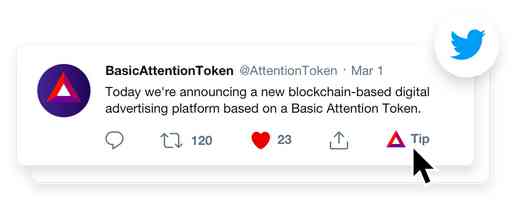You can now tip your favorite Twitter users directly with cryptocurrency with the latest build of the Chromium-based open source browser Brave.

The latest Nightly build of Brave will let users send digital tokens as a tip to tweeters of their choosing. Bear in mind though, the Nightly build is the latest beta of the browser and includes “experimental features.” As a result, the browser might not be stable and it could contain bugs that result in data loss.
When a user visits Twitter in the Brave browser, they will see a “tip” icon alongside the usual comment, like, and retweet features. This lets users send some of the browser‘s native tokens (Basic Attention Token, BAT) to the content creator.


The browser first rolled out its tip function last year when it used “tip banners” to let consumers donate to their favorite creators. However, that wasn’t strictly what was happening.
Tom Scott, a popular British YouTuber, took issue with the concept when his image was used alongside a welcome message encouraging viewers to send BAT tips despite having never even heard of Brave, The Block reported . As it turned out, Brave was collecting tips on behalf of creators that had nothing to do with the platform.
It seems Brave has modified the process since then.
If an unverified tweeter is tipped with BAT, the tip will be held in the tipper’s browser for 90 days until the creator sets up and verifies a Brave account. It’s unclear if the creator will be notified that there are tips waiting for them, though.
We’ve asked Brave about their process for notifying users, who are yet to sign up for its Creators program, and will update this piece accordingly if we hear back.
Update 13:40PM UTC, May 27, 2019: A Brave spokesperson has since reached out to Hard Fork to clarify how Twitter users can claim donations.
“Regarding tips to unverified creators, they are held in the user’s browser,” the spokesperson told Hard Fork. “If you tip a creator who has not yet verified, your tip will be held locally in your browser until that creator verifies with Brave’s Creator Program . If they verify within 90 days, your tip will be transferred. If not, then it is returned to your Brave Rewards wallet.”
Facebook’s Libra partners remain cautious amid growing scrutiny from regulators
Facebook‘s Libra partners have reportedly signed non-binding agreements, meaning they’re not obliged to promote or use the digital token and can abandon the project if they decide to do so.

According to the New York Times , which cites anonymous executives from seven of Facebook‘s partners, some of the companies are being cautious about associating themselves too closely with Libra due to the company’s ongoing issues with regulators.
The technology giant made headlines last week after it announced Libra’s upcoming launch and revealed its 27 partners, including Mastercard, Uber, and Visa.
Not long after that, Maxine Waters, chairwoman of the House of Financial Services Committee, set hearings to look into Libra more closely and told the company to cease the project‘s development until questions were answered.
Watch this Bitcoin scammer get called out directly over Skype
Dutch journalist and TV presenter, Jort Kelder, called out a Bitcoin scammer over Skype following the illicit use his face.

Researchers located and revealed the names of a number of companies that have been using the faces of celebrities to promote heinous Bitcoin scams, Brandpunt+ reported earlier this year .
Brandpunt+ then launched a deeper undercover investigation which eventually led to Kelder confronting one of the person’s believed to have used Kelder’s face to scam people.
In an exclusive episode released on Brandpunt+’s YouTube channel yesterday, Kelder is seen contacting one of the alleged scammers. He tells the supposed miscreant: “If you take a closer look, I’m Jort Kelder and you used my head for this internet scam.” After a brief conversation, he hangs up and tells the supposed scammer: “By, bye, I’ll see you in jail.”
Kelder’s face and image, along with a host of other celebrities, including Big Brother creator John de Mol , have been used by scammers to lure victims into believe their Bitcoin scams are legitimate.
The scammers, which Brandpunt+ believes are located in Prague, Czech Republic, mock up fake news articles using celebrity imagery as endorsements.


The articles encourage victims to invest money into the latest get-rich-quick scheme, with headlines such as: “The most recent investment from Jort Kelder surprises experts and frightens large banks!”
Kelder also tells the Bitcoin con artist to “stop this kind of business.” But it seems the confrontation wasn’t enough for the Dutch celebrity.
Kelder is also reportedly taking legal action against the companies uncovered in Brandpunt+’s investigation and is setting up a foundation to fight those that use celebrity imagery without permission.
He’s asking other celebrities to join him in his crusade. Kelder hopes that John de Mol, who is trying to sue Facebook over the illicit use of his face in scam adverts, will join his organization.
Sadly, this kind of scam is nothing new. In Australia, victims were conned out of $14.8 million in seven months , with many of the scams believed to feature fake celebrity endorsements.
Want more Hard Fork? Join us in Amsterdam on October 15-17 to discuss blockchain and cryptocurrency with leading experts.











